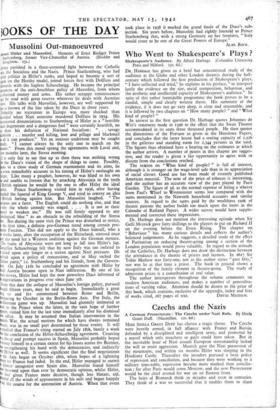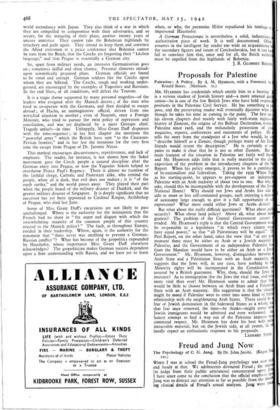Czechs and the Nazis
A German Protectorate : The Czechs under Nazi Rule. By Shiela Grant Duff. (Macmillan. 12s. 6d.) MISS SHIELA GRANT DUFF has chosen a tragic theme. The Czechs were heavily armed, in full alliance with France and Russia, defended by a disciplined and intelligent army, and protected by a massif which only treachery or guile could have taken. But in the inevitable hour of Nazi assault European statesmanship lacked the will to resist aggression. Munich gave the Nazi possession of the mountains, and within six months Hitler was sleeping in the Hradcany Castle. Thereafter the invaders pursued a twin policy of repression and conciliation, and because they were working to a military time-table, repression became more marked than concilia- tion ; for after Paris would come Moscow, and the new Protectorate would be the chief arsenal for war on an Eastern front.
The heirs of Bismarck think .in decades and even in centuries. They think of a war so successful that it enables them to share
world ascendancy with Japan. They also think of a war in which they are compelled to compromise with their adversaries, and so secure, for the maturing of their plans, another twenty years of uneasy armistice. They cannot take the Bohemian highlands by treachery and guile again. They intend to keep them and convince the Allied statesmen at a peace conference that Bohemia cannot be torn from the Reich, that the Czechs are forgetting their " kitchen language," and that Prague is essentially a German city.
So, apart from military needs, an intensive Germanisation goes on ; sometimes skilful and often clumsy. Personal elements intrude upon scientifically prepared plans. German officials are found to be venal and corrupt. German soldiers like the Czechs upon whom they are billeted. The Czechs, tough and working under- ground, are encouraged by the examples of Yugoslays and Russians. In the end Slays, of all conditions, will defeat the Teutons.
It is a tragic theme supported by many personal tragedies—of the leaders who resigned after the Munich decree ; of the men who tried to co-operate with the Germans, and then decided to escape abroad ; of Hacha, an unimaginative official, driven from one wretched situation to another ; even of Neurath, once a Foreign Minister, who tried to pursue the twin policy of repression and conciliation, and was yet displaced by a mere Gestapo chief. Tragedy unfurls—in time. Unhappily, Miss Grant Duff dispenses with the time-sequence ; in her first chapter she mentions the " powerful army " which the British have sent " to the Caucasus- Persian frontier," and in her last she mentions for the very first time the escape from Prague of Dr. Jaromir Necas.
This method encourages discursiveness, repetitiveness, and lack of emphasis. The reader, for instance, is not shown how the Sokol movement gave the Czech people a natural discipline after the German entry into Prague, or how the Yugoslav Sokols helped to overthrow Prince Paul's Regency. There is almost no mention of the faithful clergy, Catholic and Protestant alike, who remind the people, when all is dark, that evil does not endure ; it is " of the earth earthy," and the world passes away. They played their part when the people heard of the military disaster of Dunkirk, and the greater military disaster of Singapore. It is deeply significant that no successor has yet been appointed to Cardinal Kaspar, Archbishop of Prague, who died last June.
Some of Miss Grant Duff's excursions are not likely to pass unchallenged. Where is the authority for the insinuation that the French had no share in " the anger and disgust with which the overwhelming majority of the common people of this country reacted to the Munich policy? " The fault, as throughout Europe, resided in their leadership. Where, again, is the authority for the statement that " there never was anything to prevent a German- Russian conflict "? What has become of the geopolitics expounded by Haushofer, whose importance Miss Grant Duff elsewhere acknowledges? The geopolitician makes German success dependent upon a firm understanding with Russia, and we have yet to learn
when, or why, the paranoiac Hitler repudiated his tutelage to impersonal Haushofer.
A German Protectorate is nevertheless a solid, industrious authoritative piece of work. It is well documented. Often assumes in the intelligent lay reader too wide an acquaintance the secondary figures and issues of Czechoslovakia, but it can ha fail to convince him that, once and for all, the Reich author] must be expelled from the highlands of Bohemia.
J. R. GLORNEY BOLT°.



























 Previous page
Previous page